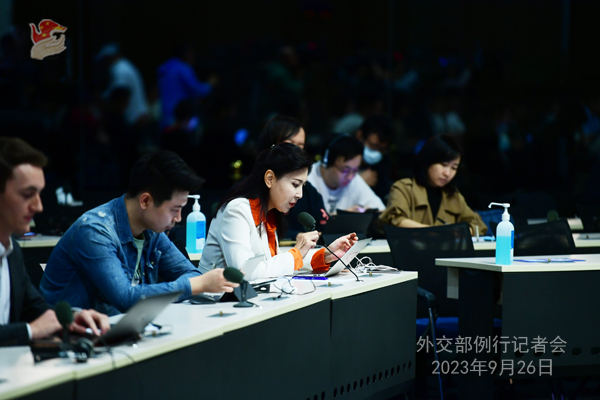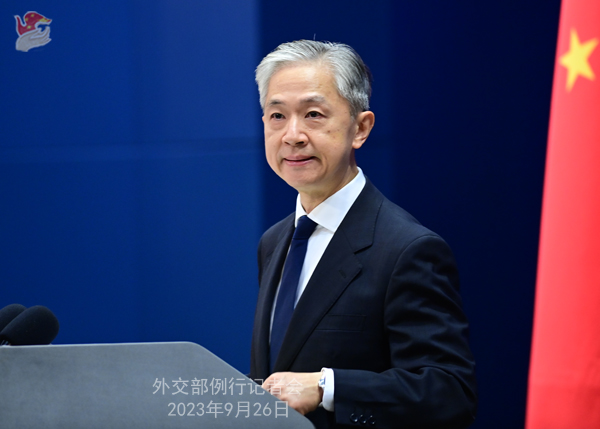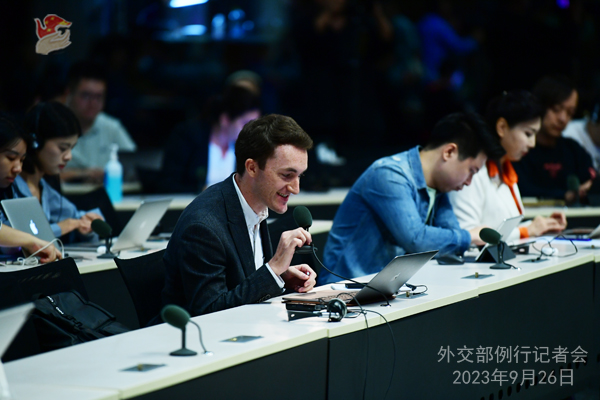| Foreign Ministry Spokesperson Wang Wenbin’s Regular Press Conference on September 26, 2023 |
| 2023-09-26 20:58 |
|
Global Times: Yesterday was the first day of Thailand’s temporary visa-free entry program for Chinese tourists. Could you share more details with us? Wang Wenbin: The Thai Government announced a five-month visa-free entry program for Chinese tourists starting on September 25. Yesterday, the first group of Chinese tourists under the new visa-free policy arrived in Thailand. Thai Prime Minister Srettha and other government officials greeted them at the airport. China welcomes Thailand’s short-term visa exemption policy for Chinese tourists and appreciates the welcome extended by Prime Minister Srettha to our fellow Chinese. China and Thailand are close friends and neighbors and a community of shared future. To have more people-to-people exchange is absolutely essential for strengthening the traditional familial bond between our two countries and an important part of building a China-Thailand community with a shared future in the new era. We stand ready to work with Thailand to expand cooperation in tourism, education, culture and other areas to further enhance the close ties between our peoples. Since early this year, there has been a surge in outbound trips by Chinese tourists. The Ministry of Foreign Affairs has come up with better visa and related policies, launched a series of facilitation measures in collaboration with other government agencies and given guidance to our diplomatic and consular missions overseas to do everything possible to keep channels open and smooth for foreigners’ travel to China. We welcome more friends from around the world to come and experience China. CCTV: Could you update us on the preparations for the third Belt and Road Forum for International Cooperation? How many countries have confirmed their attendance? Wang Wenbin: Preparations for the third Belt and Road Forum for International Cooperation are making steady progress. As of today, representatives from more than 130 countries as well as many international organizations have confirmed that they will attend the Forum. China will stay in communication with Belt and Road cooperation partners on the preparations for the Forum. AFP: Some media reported yesterday that North Korea has reopened its borders to foreign visitors. Does the Chinese foreign ministry have any more information on this situation? Wang Wenbin: China has not been notified through diplomatic channels by the DPRK on the reopening of its borders. Prensa Latina: We would like to know your opinion about the terrorist attack against the Cuban embassy in the United States. Wang Wenbin: China condemns all forms of violence targeting diplomatic missions. In accordance with the Vienna Convention on Diplomatic Relations, the host country has obligations to take necessary measures to protect diplomatic personnel and premises. We call on the US to find out what happened, solve the case speedily and take effective measures to protect the security of diplomatic missions and personnel. Dragon TV: According to reports, on September 26, a plenary meeting of the Central American Parliament approved a special agreement on the accession of the National People’s Congress of China as a permanent observer. What’s your comment? Wang Wenbin: On September 26, a plenary meeting of the Central American Parliament approved with strong support a special agreement on the accession of the National People’s Congress of China as a permanent observer. The plenary meeting also approved with strong support the August plenary meeting minutes, which contains the resolution to revoke the “permanent observer status” of the so-called “Legislative Yuan” of the Taiwan region and accept the National People’s Congress of China as a permanent observer. We applaud that decision. It reflects the Central American Parliament’s firm resolve to develop relations with China and again shows that the one-China principle represents the prevailing consensus of the international community and the unstoppable trend of the times. China stands ready to further develop and consolidate friendly cooperative relations with the Central American Parliament and Central American countries on the basis of the one-China principle.
Reuters: The US Space Force has had internal discussions about setting up a hotline with China to prevent crises in space. Reuters has reported this. The US chief of space operations said a direct line of communication between the US Space Force and its Chinese counterpart would be valuable in de-escalating tensions, but as of today the US has not engaged with China to set this up. Does the ministry have any comment on this? And would China be open to this hotline? Wang Wenbin: On that question, I’d like to refer you to the competent authorities. The US is clear about what caused the difficulty in having China-US mil-to-mil dialogue. Bloomberg: My question is about the negotiations with Sri Lanka on the debt issue. Is China close to agree on terms on the bilateral debt restructuring with Sri Lanka? And if so, do you have any details on how this might work or any idea about when this might be announced? Wang Wenbin: Let me say again that we support Chinese financial institutions in actively working out the debt treatment with Sri Lanka. We are ready to work with relevant countries and international financial institutions to jointly play a positive role in helping Sri Lanka navigate the situation, ease its debt burden and achieve sustainable development. CCTV: The State Council Information Office released a white paper titled “A Global Community of Shared Future: China’s Proposals and Actions” this morning. Could you share China’s consideration behind this? Wang Wenbin: This year marks the tenth anniversary of President Xi Jinping’s vision of building a community with a shared future for mankind. This morning, the State Council Information Office released the white paper “A Global Community of Shared Future: China’s Proposals and Actions”. Member of the Political Bureau of the CPC Central Committee and Foreign Minister Wang Yi attended the press conference. He gave opening remarks and took questions from the press. He pointed out in his remarks that the white paper is an important document that systemically outlines the core components of the thinking behind the vision and how it has been practiced. The document is also an important action on implementing Xi Jinping Thought on Socialism with Chinese Characteristics for a New Era and Xi Jinping Thought on Diplomacy. We hope that the white paper will help people in all sectors and the world to gain a fuller understanding of the far-reaching significance of the vision and get to know the ideals underpinning China’s major-country diplomacy. I also wish to stress that first, the vision of building such a global community is consistent with the prevailing trend of history. It responds to the call of the times and reflects the call of people in the world for peace, justice and progress. The vision represents the sum of what matters for building a beautiful world as recognized by all. As such, it has become a great banner that leads the trend of the times and the direction of human progress. It means a great deal to efforts to promote solidarity and cooperation among all countries and create a better future for all. Second, personally advocated by President Xi Jinping, the vision has been translated into action, gained immense support and produced notable results. The vision has brought prosperity and stability and created tangible benefits for people’s wellbeing across the world. Third, China is both an advocate and a doer in delivering that vision. We have worked actively to promote high-quality Belt and Road cooperation, proposed and delivered on the Global Development Initiative, the Global Security Initiative and the Global Civilization Initiative. We are working with more and more countries and regions to jointly build such a global community, so that we can contribute ideas and strength to response to global challenges and better global governance, and make greater contribution to world peace and development. A bright future will not come by itself. It calls for the joint efforts of all. The vision will not be accomplished overnight, and the course of doing that will be no plain sailing. It calls for unity among all countries and common action for common good in order to make our planet a beautiful home for all. China stands ready to enhance solidarity and cooperation with countries in the world, work together to play a bigger role in advancing human progress and the modernization process, and jointly build an open, inclusive, clean and beautiful world that enjoys lasting peace, universal security and common prosperity. AFP: The Philippine Coast Guard said yesterday that it had removed a floating barrier at a disputed reef in the South China Sea. This barrier was apparently placed to prevent Filipino boats from accessing a traditional fishing zone. Does the foreign ministry of China have any comments on this? Wang Wenbin: That’s what the Philippines tells itself. China’s resolve in safeguarding its sovereignty and maritime rights and interests over Huangyan Dao is unwavering. We call on the Philippines not to make provocation or stir up trouble.
Reuters: The heads of Russian energy firms Gazprom and Rosneft will join President Vladimir Putin’s retinue during his visit to China next month, according to a Reuters report. It was understood that senior energy officials would also be in the delegation. Could we confirm that the Gazprom and Rosneft chiefs will be visiting China together with President Putin? And if so, when will the visit be, and will all of them be attending the BRI Forum? Wang Wenbin: The third Belt and Road Forum for International Cooperation will be held in October this year. China and BRI partners are in close communication on this. We welcome countries engaged in Belt and Road cooperation to come to Beijing, explore more possibilities for cooperation and achieve development together. AFP: China, South Korea and Japan are reportedly holding a diplomatic meeting today to discuss a possible three-way summit between the countries’ leaders. Do you have any information on today’s meeting or on the progress of the plans for a three-way leaders’ summit? Wang Wenbin: Today, a meeting of senior officials from China, Japan and the ROK was held in Seoul. Assistant Foreign Minister Nong Rong, ROK Deputy Foreign Minister Chung Byung-won, Japanese Senior Deputy Foreign Minister Takehiro Funakoshi and Trilateral Cooperation Secretariat (TCS) Secretary-General Lee Hee-sup attended the meeting. During the meeting, the three parties held in-depth discussions on working for the steady resumption of trilateral cooperation. They agreed that trilateral cooperation serves the common interests of the three parties and it’s necessary to work together to step up practical cooperation in such fields as culture and people-to-people exchanges, economy and trade, scientific and technological innovation, sustainable development and public health to make new progress in trilateral cooperation and make new contribution to regional peace, stability and prosperity. The three parties agreed to hold a foreign ministers’ meeting in the coming months and maintain communication on holding a leaders’ meeting at the earliest opportunity convenient to all three countries. Before the meeting, ROK Foreign Minister Park Jin had a group meeting with the representatives of the three countries attending the meeting. Bloomberg: On your last question, you said that the three nations agreed to hold a foreign ministers’ meeting first and then the leaders’ summit will hopefully come after that. Is that correct? Wang Wenbin: As I shared with you just now, our three countries agreed at the senior officials’ meeting to hold a foreign ministers’ meeting in the coming months and maintain communication on holding a leaders’ meeting at the earliest opportunity convenient to all three countries. AFP: The International Energy Agency said today that it has revised its assessments for reducing carbon emissions in order to achieve Paris climate goals. They said that wealthy countries must now reach carbon neutrality by 2045, which is five years earlier than they said previously; while China must reach carbon neutrality by 2050, which is 10 years earlier than they said previously. Meanwhile, China’s own target for achieving carbon neutrality remains 2060. Did the Chinese foreign ministry notice this report? And does it have any comments on when China aims to achieve carbon neutrality? Wang Wenbin: China is a doer in ecological conservation and climate governance. China has always taken the initiative to assume international responsibilities commensurate with our national conditions and steadily scaled up our climate actions. Having over-shot the climate action targets of 2020 ahead of schedule, China has announced the targets for carbon peaking and carbon neutrality since September 2020, raised the goals of Nationally Determined Contributions, and published a series of policies and measures involving domestic coal consumption, coal-fired power plants and not undertaking new overseas coal-fired power projects. To deliver on them, China will go through broad-ranging and deep-going economic and social reforms which require painstaking efforts. China’s determined and results-oriented climate response is widely recognized by the international community. Reuters: You mentioned that the BRI Forum preparations are underway. Could we know which dates will the BRI Forum be held next month? Wang Wenbin: We will release information in due course.
|
 | ||||||||||||
 | ||||||||||||
|



